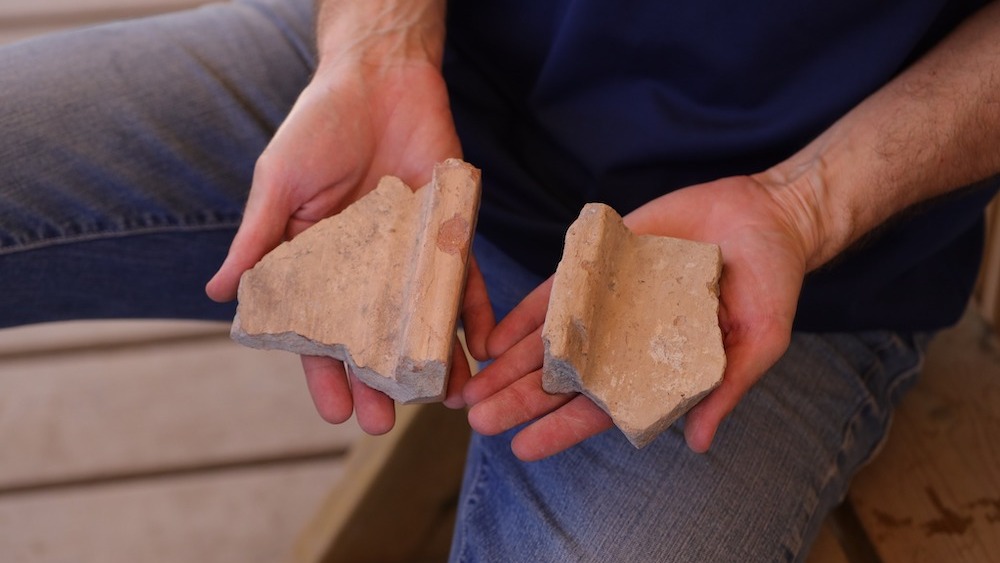2,200-year-old tiles found in Jerusalem provide direct link to the history of Hanukkah
Archaeologists in Jerusalem have unearthed 16 ceramic tile fragments used in the construction of a Greek fortress.

Get the world’s most fascinating discoveries delivered straight to your inbox.
You are now subscribed
Your newsletter sign-up was successful
Want to add more newsletters?

Delivered Daily
Daily Newsletter
Sign up for the latest discoveries, groundbreaking research and fascinating breakthroughs that impact you and the wider world direct to your inbox.

Once a week
Life's Little Mysteries
Feed your curiosity with an exclusive mystery every week, solved with science and delivered direct to your inbox before it's seen anywhere else.

Once a week
How It Works
Sign up to our free science & technology newsletter for your weekly fix of fascinating articles, quick quizzes, amazing images, and more

Delivered daily
Space.com Newsletter
Breaking space news, the latest updates on rocket launches, skywatching events and more!

Once a month
Watch This Space
Sign up to our monthly entertainment newsletter to keep up with all our coverage of the latest sci-fi and space movies, tv shows, games and books.

Once a week
Night Sky This Week
Discover this week's must-see night sky events, moon phases, and stunning astrophotos. Sign up for our skywatching newsletter and explore the universe with us!
Join the club
Get full access to premium articles, exclusive features and a growing list of member rewards.
A pile of ancient ceramic roofing tiles found at a national park in Jerusalem may be linked to the history of Hanukkah.
Archaeologists made the discovery during excavations at City of David National Park, located outside the walls of the Old City of Jerusalem, according to a Facebook post by the Israel Antiquities Authority (IAA) announcing the finding.
The 16 tile fragments — which date to around the second century B.C., during the Hellenistic period — are the oldest roofing tiles ever found in Israel and were brought there during the reign of the Greek Hellenistic king described in the Hanukkah story. According to the story, Antiochus IV Epiphanes invaded Jerusalem, defiled the temple and prevented Jews from practicing their religion, which ultimately led to the Maccabean Revolt. The event is commemorated as part of the Jewish holiday Hanukkah.
Related: Ancient Israel: History of the kingdoms and dynasties formed by ancient Jewish people
The new finding confirms the presence of Seleucid Greeks in the city during this time period.
"Until now, we had little material evidence for the presence of the Seleucid Greeks in Jerusalem," Filip Vukosavović, a senior archaeologist and researcher with the IAA who was part of the excavation, wrote in the post. "The new roof tiles discovered in the City of David provide tangible remains of the Seleucid Greek presence in the region, linking us with the story of Hanukkah. It's very exciting to encounter the Seleucid ruler Antiochus IV 'face-to-face' almost 2,200 years after the events of Hanukkah."
As part of the invasion, the Greek king built a fortress using the ceramic tiles, which would have been considered foreign building materials at the time, since their fragility would have made them susceptible to the elements, according to the post.
Get the world’s most fascinating discoveries delivered straight to your inbox.
"Tiles were very rare in our region during this period, and they were alien to local construction traditions, indicating that the technique of using tiles to roof parts of a tower or a structure inside that famous fortress was brought from Greek-controlled areas by foreign rulers," they wrote in the post.
Jennifer Nalewicki is former Live Science staff writer and Salt Lake City-based journalist whose work has been featured in The New York Times, Smithsonian Magazine, Scientific American, Popular Mechanics and more. She covers several science topics from planet Earth to paleontology and archaeology to health and culture. Prior to freelancing, Jennifer held an Editor role at Time Inc. Jennifer has a bachelor's degree in Journalism from The University of Texas at Austin.
 Live Science Plus
Live Science Plus










